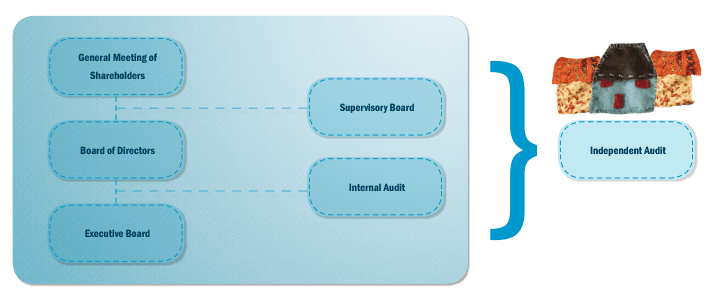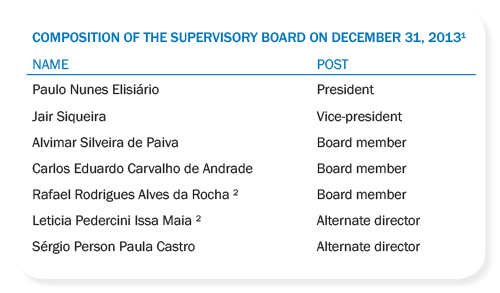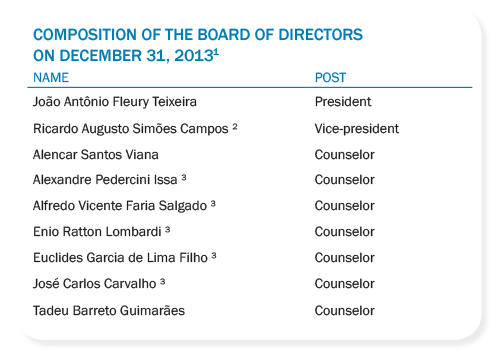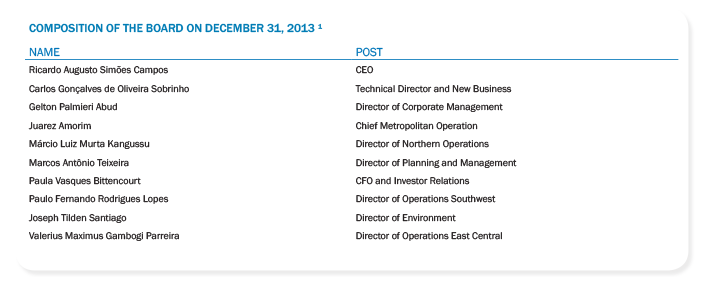Corporate Governance
[...] Waters of Minas Gerais, true wealth
Following mild to dewater.
Nurturing, swimming, sailing [...].
Governance Structure
(GRI 4.1)
Copasa is a mixed economy company, publicly traded; whose controlling shareholder is the state of Minas Gerais, with 51.1% of the shares. Since its IPO, held in February 2006 in order to ensure a balance of interests between shareholders and expand their rights in relation to law, adhered to the highest standards of corporate governance of BM & FBOVESPA's Novo Mercado.
Between good governance practices, with which the company is committed, are:
- action with a board of at least 20% independent directors, and Copasa has five independent members (62.5%), a total of eight members of the Board;
- granted to minority shareholders tag along 100% (conditions identical to those offered to majority shareholders in case of sale of control);
- dissemination of financial statements are translated into English;
- preparation and dissemination of the Code of Ethical Conduct and disclosure and securities trading policy;
- issuance of common shares, with all voting shareholders;
- free float (Shares outstanding) of at least 25%, and the Company held on December 31, 2013, 48.6% of the outstanding shares;
- conducting at least one public meeting per year with analysts and investors, aiming to submit its economic-financial, projects and prospects situation, having been held in 2013, seven meetings with the Association of Investment Analysts and Professionals of the Capital Market (Apimec), which took place in the following cities: Belo Horizonte, Brasília, Juiz de Fora, Porto Alegre, Rio de Janeiro, Sao Paulo and Uberlândia;
- resolution of any dispute or controversy that may arise between the Company, its shareholders, officers and members of the Supervisory Board, through the Chamber of Arbitration of the BM & FBOVESPA Market as arbitration clause of the Bylaws;
- sealing the accumulation of positions of chairman of the Board and Chief Executive Officer or Chief Executive of the Company, from 2014, with Copasa adopts this practice since 2007.
Representation of the governance structure of Copasa

General Meeting of Shareholders
Highest level of decision competence of the shareholders has under its exclusive competence, among other things: take the management accounts, examine, discuss and vote on the financial statements, determine the allocation of net income and dividend distribution; elect administrators and members of the Fiscal Council; resolve on reform of the Bylaws, and decide on the remuneration of directors. Additionally, the Company's Bylaws states that are the responsibility of the General Assembly the following resolutions involving amounts exceeding R$ 150 million: approval of any investment or expenditure not provided for in the annual budget, establishment of administrative tender proceedings, exemption and unenforceability of bidding and the additive terms of their contracts and approvals of administrative bidding process, signing agreements and contracts involving loans, financing and legal transactions to be executed by the Company.
Supervisory Board
Copasa has a permanent Conselho Fiscal, which can be from three to five members and an equal number of alternates, shareholders or not, elected at the Annual General Meeting. Their fees are fixed by the Assembly, under the law, and term of office is one year.

Notes: 1 The biographies of the members of the Supervisory Board may be accessed at website www.copasa.com.br / go to, Corporate Governance section. 2 Members elected as representatives of the minority.
Board of Directors
The Board of Directors, a deliberative body, is the highest court of Copasa Administration. Its responsibilities include: convening the General Meeting; approve the strategic planning, approving business plans, annual budgets and multi-year, and operating the Company's investment plans; elect and remove directors and determine their responsibilities; approve new leases with a net present value is negative, as the study of economic feasibility conducted by the Company; adopt positions and salaries and investment plan or unanticipated expenses in the annual budget of values between R$ 9 and R$ 150 million; choose and dismiss independent auditors.
The Council will be composed of at least five and at most nine members elected by the General Meeting of Shareholders. Its members meet unified term of one year, except impeachment, considering the annual exercise period each Annual General Meeting, and may be reelected.
The remuneration of each director represents 20% of the compensation paid to members of the Executive Board, and 50% of the value equals a fixed monthly payment and 50% average are paid in accordance with the participation of counsel in the monthly meetings. In addition, the directors receive 20% of the profit sharing to the directors.
(GRI 4.5)
Regarding the frequency of meetings, the Board conducts a monthly meeting, and special meetings may be held whenever necessary. According to the Bylaws of the Board, its members must declare, prior to determination, where the matter has been referred for individual or conflicting interest with the Company and shall abstain from participating in the discussion and vote.
(GRI 4.6)

Notes: 1 The biographies of the members of the Board of Directors may be accessed at website www.copasa.com.br / go to, Corporate Governance section. 2 In the present composition, only the vice chairman of the Board of Executive Officers is part of Copasa.
(GRI 4.2)
3 independent Directors (art. 14, § 2, of the Bylaws: "It is considered independent adviser that (I) has no relationship with the Company, except for equity capital, (II) is not a controlling shareholder, spouse or second degree relative of a controlling shareholder, is not and has not in the last three (3) years related to a company or entity related to the controlling shareholder (excluding from this restriction people to public education and / or research); ( III) has not been in the last three (3) years an employee or director of the Company, the controlling shareholder or controlled by the Company, (IV) is not a supplier or buyer, direct or indirect, of the Company's products or services in magnitude involving loss of independence, (V) is not an employee or officer of a company or entity offering or demanding services and / or products to the Company, (VI) is not a spouse or close relative of any director of the Company, (VII) receive no compensation from the Company other than as director (excluding from this restriction amounts in cash from any equity interest), or (VIII the elected councilor by the mechanism provided by Article 141, § § 4 and 5 and Article 239 Law 6.404/76). "
(GRI 4.3)
Executive Board
The Executive Board is responsible for managing the overall business. Ordinarily meets at least once a week and, extraordinarily, whenever required by the corporate business.
To strengthen the alignment of strategies and guidelines of the Company as well as providing tracking relevant to the company's performance issues, regular meetings of the Executive Board with the management team are held. Additionally, itinerant Board meetings occur with some executives who have strategic responsibilities for the management of investment and market expansion plan of the Company program.
The Executive Board consists of up to 11 members, shareholders or not, resident in the country, elected by the Board of Directors for a term of three years and may be reappointed, and shall remain in office until the election and investiture of their successors. It is composed of the President, Vice President and nine Directors, four operating (Operation Center-East, Metropolitan, Northern, and Southwest) and five corporate (Financial and Investor Relations, Corporate Governance, Environment, Planning and Management, and Technical and New Business).

Note: 1 The curriculum of the Executive Board may be accessed at website www.copasa.com.br / go to, Corporate Governance section.
Internal Audit
The role of Internal Audit is guided by the Annual Audit Plan approved by the Board of Directors, which is directly linked. This link gives independence and impartiality to the Audit to perform their functions, such as planning and execution of audit work on control systems, identification of gaps and / or deficiencies; proposal and accompanying improvements in internal controls. It is also responsible for generating, as a product of the above functions, useful and reliable to guide and support decisions of the Executive Board and the Board of Directors information.
The Internal Audit aims at strengthening internal controls so that they can generate reliable information for financial statements and create an environment that inhibits the practice of acts contrary to that enjoyed by the Code of Ethical Conduct and Disciplinary System of the Company.
In 2013, 21 audit works, which involved 61 organizational units, representing approximately 32.6% of the units of the Company were made. In these studies, we assessed the risks of the process, including the identification of possible corruption. The main controls of the Company are included in the system Enterprise Resource Planning (ERP), with integrated operations, allowing the units responsible for monitoring the processes and identify irregularities.
(GRI SO2)
Measures taken in corruption cases are set forth in Standard Procedure of the Disciplinary System, the Rules of Administrative Procedure for Termination of Employee and current legislation.
(GRI SO4)
Independent Audit
The company providing the audit of the financial statements of Copasa the year ended December 31, 2013 services was PricewaterhouseCoopers Independent Auditors. During the contract period, which began in March 2013, there was no provision of other services unrelated to the audit of the financial statements.
(GRI 3.13)
Ethical conduct
(GRI 4.8/GRI 4.9)
The Code of Ethics establishes Copasa corporate ethical values and guiding the Company's relationship with its stakeholders.
The Ethics Committee composed of six members, the observance of the established guidelines. For both, mentor and advise employees on issues relating to the interpretation and application of the Code of Ethics, conducts periodic lectures, receive complaints, evaluates and decides on possible breaches of the Code.
The Ethics Committee conducts weekly meetings. In 2013, talks with the aim of disseminating the guidelines of the Code of Ethical Conduct approximately 300 employees were given.
(GRI SO3)

Note: 1 As of December 31, 2013.
Also in 2013, the revised Code of Conduct and Procedures Manual for the Investigation of Complaints and Irregularities, through a working group constituted by the Ethics Committee, plus representatives of the Legal Department, Audit and Ombudsman were taken. The new versions of the Code and Manual were approved by the Executive Board and the Board of Directors. Internal Rules of the Ethics Commission was also established.
As stated in previous Sustainability Report, the following initiatives were undertaken to promote employee engagement with the theme:
- presentation on the role of the Ethics Committee of Copasa the 8th Meeting of the Council for Public Ethics with the Ethics Committees of the State of Minas Gerais;
- in partnership with the Association of Employees of Copasa, its Subsidiaries and Sponsored (Aeco) was held the Third Essay Contest and Drawing for the children and dependents of employees of Copasa, with the theme The ethics nowadays. 527 papers were presented, to prizes, of which 12 were classified as 1st, 2nd and 3rd places in four age categories, all awarded at a ceremony in November 2013;
- in partnership with the Group Theatre Copasa, an educational skit on ethics and ethical behavior in everyday life, designed for employees of the Company has been prepared.
Relationship with stakeholders
(GRI 4.14/GRI 4.16)
Copasa relates to its stakeholders according to their values, beliefs and principles, guided by the provisions of the Code of Ethical Conduct, aimed at aligning interests and identifying the expectations of the parties involved. In this sense, uses forms of interaction and relationship management with aligned channels to communicate decisions, mobilize the workforce and consolidate partnerships for sustainable development of its business and society.
To provide the proper relationship to society, the Company uses different communication channels and conducts the dialogue, especially through print and digital media, according to the reality of each stakeholder, such as posters, brochures, mailers, TV Copasa, intranet, Magazine straw,Informative Health and Life, Interviews and communication with customers through mobile devices (SMS), website (Contact Us), Facebook, Twitter and Customer Relationship Center (115).
The company implemented the communication network formed by employees in order to enhance the dialogue with stakeholders, especially employees and society, aiming at the integration of information provided by all organizational units.
Customers
Copasa relates to the users of its services by the grounded quality guidelines, with a focus on continuous improvement of the instruments used in the relationship with customers, which have service requests for services, clarification of doubts and record claims (claims and cheers). For questions that have not been resolved in instances or directly responsible units, the company offers the services of the Ombudsman (for more information: Copasa and its customers).
State of Minas Gerais
The state of Minas Gerais, with 51.1% Share Copasa, is the Company's parent. Transactions with related parties are conducted at prices and conditions considered by management consistent with those on the market, except for the form of financial settlement, which could happen through a special deal (settlement of accounts). The SEDRU is the body to which Copasa is linked institutionally to the State of Minas Gerais.
Providers
The relationship with suppliers Copasa is ruled by law, with an emphasis in Law No. 8.666/1993, which guides the selection procedures, hiring and management of suppliers and service providers by public bodies and entities. In addition, the company's relationships with suppliers of goods and services are guided by technical and professional criteria, compliance with laws and regulations, aimed at meeting the strict needs of the organization (for more information: Copasa and its suppliers).
Investors
Copasa adopts as investor relations policy transparency, timeliness and quality of information provided, thereby potentially providing subsidies that are sufficient for making decision to invest in shares of the Company.
The main communication tools used are: meetings with analysts and investors (Copasa Day,Non Deal Road Shows national and international meetings with the Association of Investment Analysts and Professionals of the Capital Market and scheduled visits); website investor relations, with content in Portuguese and English, available through the Securities Commission (CVM) and website investor relations, of reports as IBASE Social Annual Report, the full annual financial statements, the form of reference, the financial statements, annual and sustainability report, release monthly operating and release quarterly results, conference calls, quarterly, after the release of results, with simultaneous English translation. These conference calls can also be made on demand.
(GRI 4.4)
This and other information can be obtained at website www.copasa.com.br/ir. The Investor Relations team can also be contacted at e-mail ri@copasa.com.br and telephone 55 31 3250.2015.
Regulatory and inspection bodies
Copasa following determinations of government agencies responsible for issues related to their area of expertise, such as: ARSAE-MG, CVM and environmental agencies, under the supervision of the State of Minas Gerais Corporate Governance Committee.
Municipalities.
As municipalities are holders of responsibility for the provision of sanitation services, relations with Copasa they represent the grantor. The relationship between the parties is established from the granting and program, which, in turn, are formalized in line with current legislation, in particular the Federal Law 11.445/2007 contracts. In the regions where it operates, Copasa maintains direct contact and participates in meetings with representatives of local legislative and grantor in order to ensure the quality of services, establishing partnerships and renew and get new awards.
Internal public
Copasa maintains relationship with its employees, oriented respect and compliance labor, of contracts, collective bargaining agreements and internal rules (For more information: Copasa and employees).
Society
In addition to strive for excellence in providing a basic service, Copasa bases its relationship with the good practices of social and environmental responsibility, with transparency and respect for cultural values, aiming at the sustainable development of the Company's business and society. The Company conducts and supports various projects of social and cultural nature, aiming at strengthening the society and communities in which it operates (For more information: Copasa and community).
